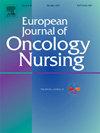根治性前列腺切除术患者的自我管理行为:结构方程模型
IF 2.7
3区 医学
Q1 NURSING
引用次数: 0
摘要
目的基于健康行为改变的综合理论,探讨影响前列腺癌根治后患者自我管理行为的因素,并探讨这些因素之间的相互作用。方法在横断面研究中,于2023年12月至2024年4月在中国温州医科大学第一医院招募281例患者。采用中文版疾病感知问卷(BIPQ)、医学结局研究社会支持调查-中文版(MOS-SSS-C)、治疗自我调节问卷(TSRQ)和癌症患者自我管理评估量表对疾病感知、社会支持、自我调节和自我管理进行评估。使用结构方程来探讨这四个变量之间的关系。结果采用健康行为改变综合理论构建的结构模型拟合良好(RMSEA = 0.073, CMIN/DF = 2.482)。疾病感知直接影响自我管理(β = - 0.416, P <;0.05),并通过自我调节间接影响自我管理(β = 0.269, P <;0.05)。自我调节直接影响自我管理(β = 0.453, P <;0.05)。社会支持间接影响自我管理(β = 0.225, P <;0.05)。这些变量占前列腺癌根治后患者自我管理行为变异性的62.9%。结论本研究提示一个模型可以更好地理解前列腺癌根治后患者的自我管理。此外,这些患者自我管理能力差。疾病感知和社会支持通过自我调节直接或间接影响前列腺癌根治后患者的自我管理。本文章由计算机程序翻译,如有差异,请以英文原文为准。
Self-management behaviors in patients undergoing radical prostatectomy: A structural equation model
Purpose
To investigate factors influencing self-management behaviors in post-radical prostate cancer patients' behaviors grounded on the Integrated Theory of Health Behaviour Change and to clarify the interactions among these factors.
Methods
In a cross-sectional study, 281 patients were recruited at The First Hospital of Wenzhou Medical University in China between December 2023 and April 2024. Illness perception, social support, self-regulation and self-management were assessed through Chinese versions of the Brief Illness Perception Questionnaire (BIPQ), Medical Outcome Study Social Support Survey-Chinese (MOS-SSS-C), Treatment Self-regulation Questionnaire (TSRQ) and The Cancer Patient Self-management Assessment Scale. Structural equations were used to explore the relationship between the four variables.
Results
The final structural model using the Integrated Theory of Health Behaviour Change showed a suitable fit (RMSEA = 0.073, CMIN/DF = 2.482). Illness perception directly affected self-management (β = −0.416, P < 0.05) and indirectly affected self-management through self-regulation (β = 0.269, P < 0.05). Self-regulation directly affected self-management (β = 0.453, P < 0.05). Social support indirectly affected self-management (β = 0.225, P < 0.05). These variables contributed to 62.9 % of the variability in self-management behaviors among patients after radical prostate cancer treatment.
Conclusions
The present study suggested a model can be useful in better understanding self-management in post-radical prostate cancer patients. Besides, these patients experience bad self-management. Illness perception and social support can affect post-radical prostate cancer patients' self-management directly and indirectly through self-regulation.
求助全文
通过发布文献求助,成功后即可免费获取论文全文。
去求助
来源期刊
CiteScore
4.40
自引率
3.60%
发文量
109
审稿时长
57 days
期刊介绍:
The European Journal of Oncology Nursing is an international journal which publishes research of direct relevance to patient care, nurse education, management and policy development. EJON is proud to be the official journal of the European Oncology Nursing Society.
The journal publishes the following types of papers:
• Original research articles
• Review articles

 求助内容:
求助内容: 应助结果提醒方式:
应助结果提醒方式:


